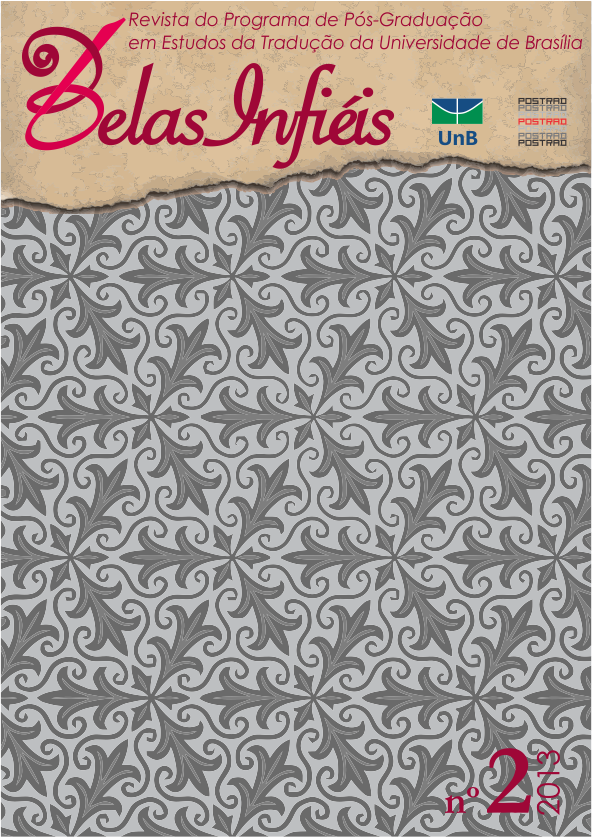NOMINAL GROUPS AS AN INDICATOR OF NON-NATIVE ENGLISH COMMUNICATION PROBLEMS IN TOP-RANKED BRAZILIAN SCIENCE JOURNALS
DOI:
https://doi.org/10.26512/belasinfieis.v2.n2.2013.11246Palavras-chave:
globalization, scientific discourse, lingua franca, SciELOResumo
This study is an attempt to document the problematic nature of an intermediary linguistic system, the lingua franca used by the scientific community, on the production and impact of science from the broad area beyond the inner circle of native English speakers. To this end, a random cross-sectional sample (n=5) of current English-language articles from top-ranked journals in the Brazil-based metapublisher Scientific Electronic Library Online (SciELO) was examined for grammatical issues, especially nominative group construction. In the studied sample, varying and in some cases elevated levels of L1 interference were found, indicating that on the best collective level, there are proficiency problems with the lingua franca, that these problems are not evenly distributed and that systematic language management yielded vastly different language quality outcomes.
Referências
DE SWAAN, A. Words of the world:the global language system. Cambridge: Polity Press, 2001.
FISHMAN, J. Ethnolinguistic democracy: varieties, degrees and limits. In: Language International. 1993, v. 1, p.11-17.
GIBBS WW. Lost science in the third world. Scientific American. 1995; 273:76-83.
HALLIDAY, M.A.K. HALLIDAY, M. A. K/ WEBSTER, J. The Language of Science (Collected Works ofM.A.K. Halliday).Continuum: London/New York, 2004.
ILIESCU GHEORGHIU, C.; LAMBERT, J. (Eds.) Universe-cities as Problematic Global Villages:Continuities and Shifts in our Academic Worlds. EDUFSC, forthcoming.
KACHRU, B. B. Standards, codification andsociolinguistic realism: the English language in the outer circle. In: QUIRK, R. & WIDDOWSON, H.G. (Eds.). English in the world: Teaching and learning the languages and literatures. Cambridge: Cambridge University Press, 1985. p. 11-30.
MENEGHINI, R.; PACKER, A. L. Is there science beyond English? EMBO Reports, 2007, v. 8, p. 112-116. Available at: <http://www.nature.com/embor/journal/v8/n2/pdf/7400906.pdf> Accessed 02.02.2012.
ONG, W. Orality and literacy: the technologizing of the world. New York: Routledge, 2002.
OPTHOF, T. Sense and nonsense about the impact factor 1997. Cardiovascular Research 33 (1997) I-7
PACKER, A. CODATA 2007 -Strategies for Open and Permanent Access to Scientific Information in Latin America: Focus on Health and Environment Information for Sustainable Development. Atibaia, São Paulo, 8-10 May 2007
SCIMAGO JOURNAL RANKING 2011. Available at: <http://www.scimagojr.com/journalrank.php>. Accessed 02.02.2012.
SEGLEN, P. Why the impact factor of journals should not be used for evaluating research. BMJ:1997, 314, p. 498”“502.
TETREAULT, J.R.; CHODOROW, M. Native judgments of non-native usage: Experiments in preposition error detection. Proceedings of the Workshop on Human Judgements in Computational Linguistics. Association for Computational Linguistics, 2008
Downloads
Publicado
Edição
Seção
Licença
Dado ao acesso público desta revista, os textos são de uso gratuito, com obrigatoriedade de reconhecimento da autoria original e da publicação inicial nesta revista
A revista permitirá o uso dos trabalhos publicados para fins não comerciais, incluindo direito de enviar o trabalho para bases de dados de acesso público. As contribuições publicadas são de total e exclusiva responsabilidade dos autores.
Os autores, ao submeterem trabalhos para serem avaliados pela revista Belas Infiéis, mantêm os direitos autorais e concedem à revista o direito de primeira publicação, sendo o trabalho licenciado sob a Creative Commons Attribution License Atribuição 4.0 Internacional (CC BY 4.0).



















